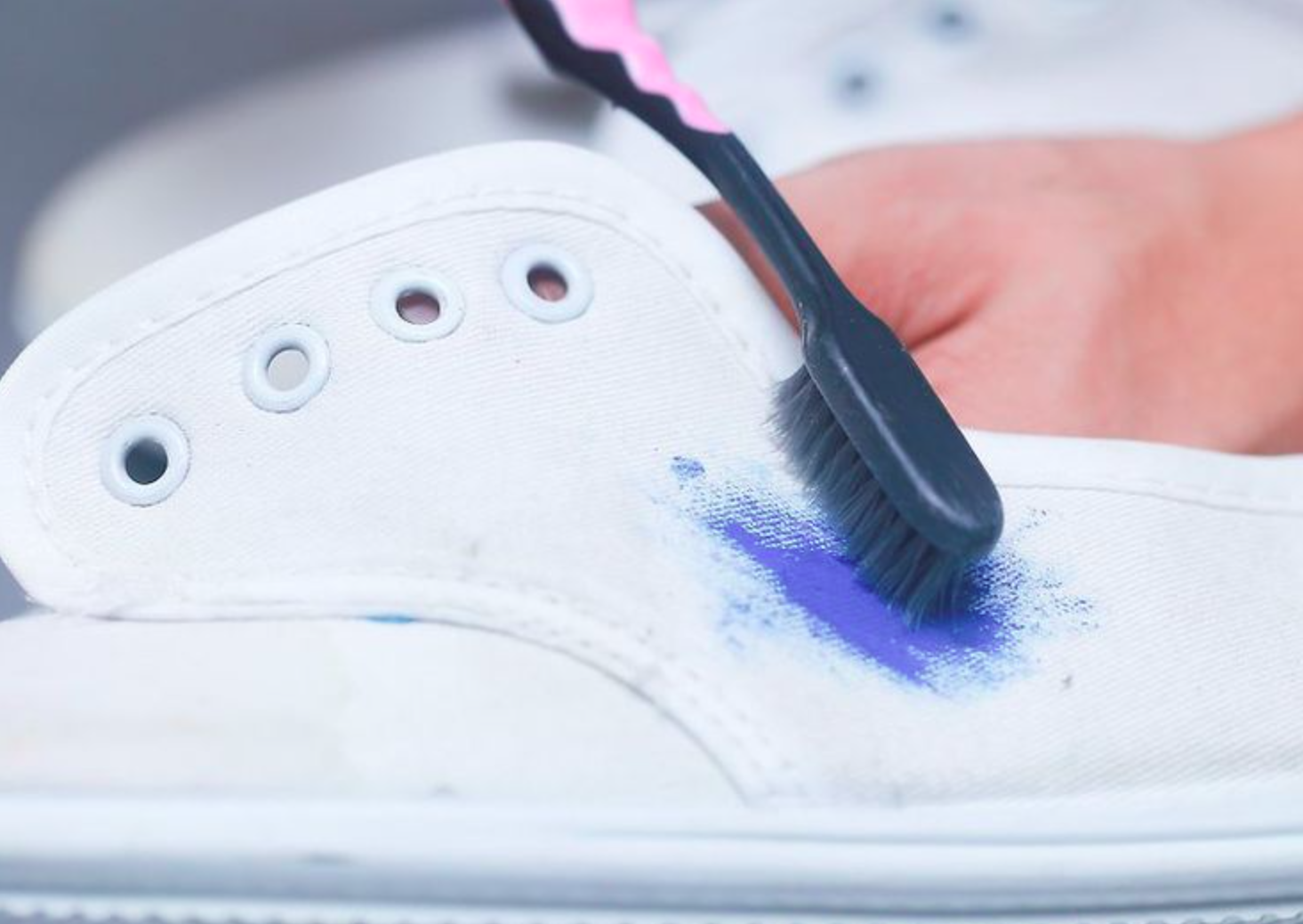Introduction
Whether you’re a professional artist who got a little too carried away or a DIY enthusiast who accidentally splashed paint while transforming old furniture, your shoes may bear the brunt of your creativity. Shoes are often one of our most cherished accessories, and dealing with paint stains can be quite disheartening. Fear not! This guide will explore effective methods for removing paint from shoes, ensuring that you can restore your beloved footwear to its former glory.
Understanding the Type of Paint on Your Shoes
A crucial step before diving into methods of paint removal is to identify the type of paint that has stained your shoes. Different paints react differently to solvents and cleaning solutions. Understanding whether you’re dealing with acrylic, oil-based, or spray paint can save you time and potential damage.
Acrylic Paint
Acrylic paint is water-based and relatively easier to remove when it is still wet. However, once it dries, it can be challenging, but not impossible.
Oil-based Paint
Oil-based paints require solvents for removal, and they often leave a greasy residue if not cleaned properly.
Spray Paint
Spray paint can bond quickly with surfaces, making it one of the toughest stains to tackle.
Method 1: Rubbing Alcohol
Rubbing alcohol, also known as isopropyl alcohol, is an effective solvent for many types of paint. Here’s how you can use it:
Steps to Follow
- Test a small inconspicuous area for colorfastness.
- Soak a cotton ball or cloth in rubbing alcohol.
- Gently blot the paint stain until it begins to lift.
- Wipe the area with a clean damp cloth.
Pros and Cons
- Pros: Effective on most paint types; easy to use; readily available.
- Cons: May discolor certain materials; requires multiple applications for stubborn stains.
Method 2: Acetone
Acetone, found in nail polish remover, can effectively break down many types of paint. However, it should only be used on durable materials.
Steps to Follow
- Dab a little acetone onto a cotton ball.
- Gently rub the paint stain without saturating the shoe material.
- Wipe the area clean with water.
Pros and Cons
- Pros: Very effective; fast-acting.
- Cons: Can damage sensitive materials; strong odor.
Method 3: Warm Soapy Water
If the paint is still wet, warm soapy water might be your best friend.
Steps to Follow
- Fill a bowl with warm water and add a few drops of dish soap.
- Soak a cloth in the solution and gently scrub the stained area.
- Rinse with clean water and air dry.
Pros and Cons
- Pros: Safe for most materials; eco-friendly.
- Cons: May not be effective on dried paint.

Method 4: Vinegar and Baking Soda
A household mix of vinegar and baking soda is an excellent eco-friendly option for paint removal.
Steps to Follow
- Mix equal parts of vinegar and baking soda to form a paste.
- Apply the paste to the paint stain and let it sit for 10-15 minutes.
- Scrub gently with a cloth and rinse with water.
Pros and Cons
- Pros: Safe and natural ingredients; effective for fresh stains.
- Cons: Can be less effective on older, more stubborn stains.
Method 5: Commercial Paint Removers
If natural methods fail, commercial paint removers designed specifically for fabric might be your best bet.
Steps to Follow
- Read the manufacturer’s instructions carefully.
- Apply a small amount on a cloth and blot the stain.
- Rinse off according to the product’s instructions.
Pros and Cons
- Pros: Targeted, efficient stain removal; formulated for stubborn stains.
- Cons: May contain harsh chemicals; can be pricey.

Method 6: Toothpaste
Believe it or not, toothpaste can work wonders on minor paint stains, especially if it contains baking soda.
Steps to Follow
- Apply a small amount of toothpaste on the paint stain.
- Use a soft-bristle toothbrush to scrub gently.
- Wipe with a damp cloth and air dry.
Pros and Cons
- Pros: Accessible and generally safe; gentle on shoes.
- Cons: Limited effectiveness on tougher stains.
Method 7: Oil-Based Cleaners
For oil-based paint stains, applying oil-based cleaners can provide effective results.
Steps to Follow
- Choose an oil-based cleaner suitable for fabric or leather.
- Apply with a cloth and blot until the paint lifts.
- Clean residue with a damp cloth.
Pros and Cons
- Pros: Good for tough, oil-based stains; readily available.
- Cons: May leave a greasy residue; requires thorough cleaning afterward.

Real-World Experiences
Understanding how others have tackled paint stains can offer valuable insights. Here are a few case studies:
Case Study 1: DIY Furniture Painter
Emily, an avid DIYer, faced splatters of yellow acrylic paint on her canvas sneakers after a weekend project. She used warm soapy water, and fortunately, the paint was still wet. She quickly scrubbed her shoes and saved them from permanent damage!
Case Study 2: The Weekend Warrior
Jake accidentally got a bit of oil-based paint on his leather boots during an outdoor project. He opted for acetone, which worked effectively but required careful application to avoid damaging the leather. Afterward, he conditioned the leather to restore its luster.
Comparison Table of Paint Removal Methods
| Method | Effectiveness | Material Safety | Availability |
|---|---|---|---|
| Rubbing Alcohol | High | Moderate | High |
| Acetone | Very High | Low | High |
| Warm Soapy Water | Moderate | High | High |
| Vinegar & Baking Soda | Moderate | High | High |
| Commercial Paint Removers | Very High | Low to Moderate | Moderate |
| Toothpaste | Low to Moderate | High | Very High |
| Oil-Based Cleaners | High | Low | Moderate |

Tips for Preventing Paint Stains on Shoes
Preventing paint stains is always better than cleaning them up. Here are a few tips to keep your shoes safe:
- Wear Old Shoes: If you know a messy project is ahead, wear shoes that you don’t mind getting stained.
- Use a Drop Cloth: A simple drop cloth can protect your floor and reduce paint splatter on your shoes.
- Keep Paint Containers Covered: When not in use, ensure that paint containers are tightly sealed to avoid accidents.
FAQs About Removing Paint from Shoes

1. Can I use vinegar to remove paint from shoes?
Yes, vinegar can be an effective method, especially when mixed with baking soda. This natural solution works best on water-based paints.
2. What should I avoid when removing paint from shoes?
Avoid using harsh chemicals that could damage the material of your shoes. Always test in an inconspicuous area first.

3. How do I know if the paint is dried?
Touch the paint; if it feels hard and no longer smudges, it is likely dried. You may also check the edges for crispness.
4. Will acetone ruin my shoes?
Acetone can damage certain materials, especially delicate fabrics or painted surfaces. Always test a small area before applying.

5. How long should I let a stain remover sit?
This depends on the product used; follow manufacturer instructions, but generally, 10-15 minutes is effective for most home remedies.
6. Is it possible to completely remove paint stains?
It depends on the type of paint and how long it has set. Many stains can be significantly reduced but complete removal is not always guaranteed.
7. Can professional cleaning help?
Yes, if the shoes are valuable or the stains are particularly stubborn, professional cleaning can achieve results that home methods sometimes cannot.
8. What if I damage the shoe material during cleaning?
If you accidentally damage the material, consider using a repair kit or taking them to a cobbler for professional help.
9. Are there paint protective sprays available for shoes?
Yes, there are sprays designed to create a protective barrier on shoes, preventing paint from adhering to them in the first place.
10. How often should I clean my shoes to prevent stains?
Regularly clean your shoes after any messy activities. Additionally, consider treating your shoes with protective sprays for added safety.
11. Can I use dish soap to clean paint stains?
Yes, dish soap mixed with water can help lift paint stains, especially if the paint is water-based and hasn’t been allowed to dry.
Conclusion
Removing paint from shoes might seem daunting, but with the right methods and a little patience, it’s entirely manageable. Whether you choose natural solutions or commercial products, remember to assess the type of material and paint involved. Happy cleaning, and may your shoes always look their best!